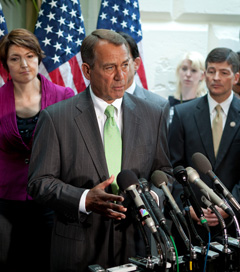Washington – Lawmakers trying to reach a deal on spending cuts in order to raise the nation's debt ceiling risk causing serious economic harm if they cut government programs too much in the near term, economists warn.
The U.S. economy grew at an anemic 1.3 percent rate from April to June, the Commerce Department reported Friday. It also revised downward the growth rate over the first three months of 2011 to just 0.4 percent.
Despite the weak growth, politicians aren't arguing about stimulating the economy; rather they're debating how quickly and how much to cut spending, thus shaving economic growth in the process.
The U.S. Chamber of Commerce called on lawmakers Friday to be mindful of the weak economy.
“The recovery is clearly on a lower trajectory, and it will likely be some time before the economy rebounds to the point it will create much in terms of job growth,” Martin Regalia, the group's chief economist, said in a statement.
That means, he said, that “the stakes on the debt limit debate … are that much higher. With growth rates this low, even a small negative impact resulting from failure to increase the debt ceiling and defaulting on our obligations could turn the economy back into a recession.”
While Republicans in the House of Representatives capture headlines by demanding steep spending cuts, the version proposed by Senate Democrats actually would thwart economic growth potentially more, according to two economic research groups.
Macroeconomic Advisers, a leading forecaster, said Thursday that a rewritten plan offered by House Speaker John Boehner, R-Ohio, would shave more than a tenth of a percentage point off of growth next year, while the plan being pushed by Senate Majority Leader Harry Reid, D-Nev., would cause an even larger hit on growth in fiscal 2013 — shaving almost half a percentage point.
That view was shared by Thomas Lam, Singapore-based chief economist at OSK-DMG, a joint venture of Malaysian securities firm OSK Holdings Bhd. and Germany's Deutsche Bank AG.
“Our calculations … suggest that the Senate and House proposals, respectively, could lower economic growth on average by less than 0.5 percentage points, all else equal, over the next five years (from 2012 to 2016),” Lam said in a research note that suggested the Senate Democrat plan would hit the economy harder.
The chief economist for forecaster IHS Global Insight, Nariman Behravesh, warned Friday that “a weak economy will only make the tough decisions on the budget even more difficult and the case for fiscal austerity in the near-term even weaker.”
Some House Republicans backed by tea party groups demand even deeper front-end cuts, perhaps as much as $100 billion, arguing that politicians can't be trusted to keep their promises further out.
That'd be dangerous, warned Mark Zandi, chief economist for forecaster Moody's Analytics.
“I think the idea is a very serious policy error,” he said. “This would be the fodder for another recession. The economy may be able to digest $25-30 billion more (in federal spending cuts) … but $100 billion, I don't think it could digest that.”
Zandi, who's frequently cited by Republicans and Democrats alike, favors spending cuts “when the economy is off and running,” but he cautions that “to add more fiscal restraint in the latter part of 2011 and 2012 would be a mistake.”
© 2011 McClatchy-Tribune Information Services
Truthout has licensed this content. It may not be reproduced by any other source and is not covered by our Creative Commons license.
Join us in defending the truth before it’s too late
The future of independent journalism is uncertain, and the consequences of losing it are too grave to ignore. To ensure Truthout remains safe, strong, and free, we need to raise $43,000 in the next 6 days. Every dollar raised goes directly toward the costs of producing news you can trust.
Please give what you can — because by supporting us with a tax-deductible donation, you’re not just preserving a source of news, you’re helping to safeguard what’s left of our democracy.
